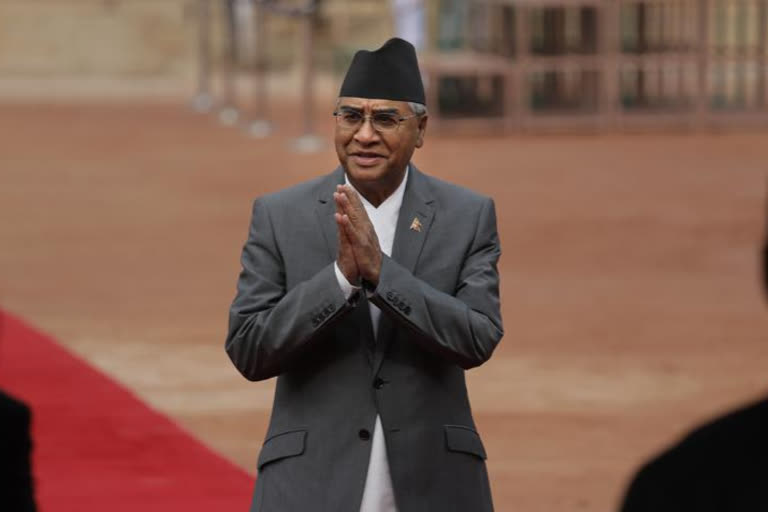New Delhi: Amid the six turbulent months of internal political crisis, Nepal finally has its new Prime Minister- Sher Bahadur Deuba, leader of the Nepali Congress, who is the Nepal PM for the 5th time. His appointment comes at a very crucial time as the Himalayan nation is seeking political stability. But what will the Deuba government mean for India? What new synergy of changes can be expected in India-Nepal ties? ETV Bharat spoke to foreign policy experts on the same.
In an exclusive conversation with ETV Bharat, Former ambassador Jitendra Tripathi said, “Deuba government will be much more favourable to India because traditionally, Nepali Congress has been a very close ally with India. During his 4 previous terms as the premier of Nepal, Deuba was very much pro-India. And immediately after taking over as Prime Minister for the 5th time, Deuba has clarified that his agenda will be to have good relations with India and to solve the border problems with India very amicably. This sends a clear message to the world that he is not going to be subdued by the Chinese pressure and he will act on his own as India’s ally".
Read:| There is a cost to everything China does, even humanitarian efforts, says expert
When asked if Deuba will also play the China card just as KP Sharma Oli, Tripathi added, “Deuba will be a close ally of India and therefore, there would be no scope of China card in Deuba’s regime”. KP Sharma Oli had so far used the China card quite effectively especially during elections. Whenever Oli was politically dethroned or was facing trouble, he would most often stir up anti-India feelings and get the people behind him.
Further, talking about the likely approach by the Deuba government when it comes to border issues between India and Nepal, Tripathi pointed out that, unlike Oli, Deuba has made it clear that whatever problem is there between India and Nepal, would be solved amicably and with mutual consent. “However, if any solutions put forward by Nepal are not accepted by the Indian government, it will not be thought about. So Deuba will think about a solution which could satisfy both parties and that means retaining the status quo”, he added.
Tripathi said that the new government in Nepal will weaken the communist party as well as China because now China’s road to influence in Nepal will not be easy. "But that does not mean that the Deuba government will snap all political and diplomatic relations with China but Chinese influence will weaken”, he stated.
It is expected that Nepal will see more stability because Deuba is respected and Nepali Congress as a party has been a respectable party as well. By and large, Deuba has got support from many leaders of opposition which will ensure the stability of the government, Tripathi said.
Read:| Nepal's new PM Sher Bahadur Deuba wins vote of confidence in Parliament
Deuba won a vote of confidence on Sunday after a five-member Constitutional bench of the Supreme Court led by Chief Justice Cholendra Shumsher Rana reinstated the dissolved House of Representatives for the second time in five months. During the confidence vote, Deuba, the 75-year-old President of the Nepali Congress, secured 165 votes in the 275-member House, more than the 136 required to win parliament’s confidence.
Sunday's outcome of the trust vote paves the way for Deuba to remain in office for the next one and a half years until the fresh parliamentary election is held.
Taking a diplomatic approach, Professor SD Muni, India’s former Special Envoy for Southeast Asian Countries for the UN Security Council Reforms and former ambassador to Lao People’s Democratic Republic, said that with the appointment of the new government, India-Nepal relations will continue as it is. “I do not see any significant warmth or improvement in the relations because India was so far supporting Oli and even now they may have all kinds of other ideas. But normal relations will continue”.
Talking about the border issue, Muni said that no major shift or change may be evident. He opined that Deuba would be busy managing his government because it is a four-coalition government-the Maoist, the UML, the terrai people and they are all divided internally. “Deuba will possibly have a problem in managing the Cabinet but he has got a good confidence vote and let us hope that those who have voted will continue to support the government”, he explained.
Read:| Nepal gets new PM sans political stability; confidence vote to decide govt's tenure
Also, China’s relation with Nepal will remain the same as I do not see the Deuba government will go beyond any limit to cultivate China or carry out the Chinese wishes in Nepal, Professor Muni added. Earlier on Monday, Prime Minister Narendra Modi had a telephonic conversation with Sher Bahadur Deuba, to congratulate and extend his best wishes for Deuba's appointment as the Prime Minister of Nepal and for winning the confidence vote in Parliament.
Recalling the unique and millennia-old people-to-people linkages that underpin the special friendship between India and Nepal, the leaders agreed to work together to enhance bilateral cooperation in all areas. They discussed, in particular, ways to strengthen cooperation and coordination in the context of ongoing efforts against the COVID-19 pandemic. On Sunday after winning the vote of confidence, Deuba thanked Prime Minister Modi for his congratulatory message and said in a tweet, “I look forward to closely working with you to strengthen the relationship between our countries and people”.



